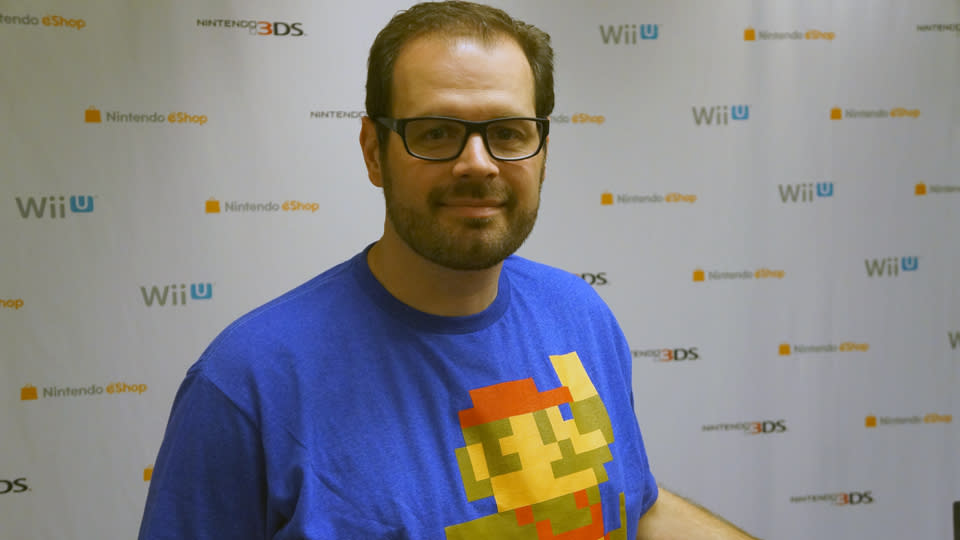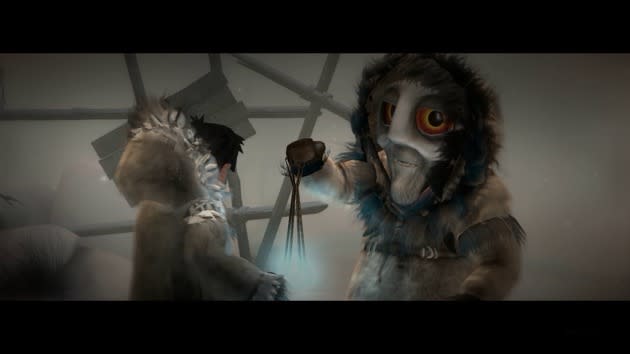It's complicated: Nintendo's relationship with indie gaming

Independent games are a cornerstone of Sony's PlayStation 4 messaging, and a contributing factor to the system's blockbuster success. They are not for Nintendo -- neither for the Wii U, nor the 3DS. An unsurprising strategy given the Japanese company's reliance on Mario and Zelda, its familiar, first-party franchises. And yet, independent games have had a presence on the company's digital software channel, the eShop, for almost a decade. Only now, they're more noticeable. "We've been supporting Indie content and self-publishing for a really long time," says Damon Baker, senior manager of licensing at Nintendo. "I mean, [going] back to the WiiWare, DSiWare days. But I think that it's just a more visible community because there's so much talent that's coming out of it; there's so much coverage for it that it just makes it naturally higher profile."
Nintendo's approach to indie games is changing, albeit slowly and methodically as is the company's way. Major titles like Don't Starve: Giant Edition (what Nintendo and the game's maker Klei are calling the "Definitive Edition") and Octodad: Dadliest Catch will soon be available for download on the eShop. Whether or not that's due to Sony's influence on the genre, Baker wouldn't say. But he maintains an indie push was always part of the strategy for the Wii U. The trouble was getting it done right -- the Nintendo way.
"I think what has changed is the learning process over time on what features and functionality that consumers gravitate towards; what are the things that the developers need to be successful on Nintendo platforms? And I think that's been a learning process because we certainly didn't have all the answers from the very beginning," Baker says.

Don't Starve: Giant Edition for Wii U is considered by developer Klei to be the 'definitive edition.'
He's not incorrect. During the Wii U's initial launch window, Little Inferno, the cute, quirky and critically acclaimed indie title, was present on the eShop. It was also an arguably better effort than Nintendo's own first-party titles available at the time as it made skillful use of the touchscreen GamePad. But because of how the eShop was programmed, not many players knew of its existence or merit. That's no longer the case, though. Baker says his team is now proactive in reaching out to select indie developers (or "Nindies," as the company calls them) so that Nintendo can work with them "hand in hand to create these effective marketing and messaging strategies so all of that quality rises to the top."
"Honestly, we don't hand out money. It's very rare that anything like that happens."
"One thing we do is we hold hands with the developers and a lot of this key content that is coming out to give them examples of best practices and simple things: how to create a fact sheet; how to create a trailer; how to create an optimum demo experience; how to write a press release," says Baker.
Nintendo's sudden public embrace of indie games could also help reverse an image problem that's long plagued the company: its purportedly poor relationship with third-party developers. Baker dismisses this notoriety as a misperception and insists that the situation is quite the opposite. "We actually have better relationships with our publishers and developers than we've ever had before," he says. "I mean, the people that work with us love working with us. ... I think it's more of an assumption that we don't have the strongest relationships with our third-party partners."

Never Alone, a puzzle platformer created in collaboration with Alaska Natives the Iñupiat
Perhaps surprisingly, Nintendo does not mandate exclusivity -- even timed exclusives -- for indie developers that seek to publish on its platforms. "Honestly, we don't hand out money. It's very rare that anything like that happens," says Baker. What Nintendo does instead is start the conversation with developers early on and, depending on whatever release window is specified, offers advice as to what additional content or features could be added to the Wii U or 3DS versions to make it worth the investment.
"I think the angle that we take is, if we're not able to get a game for an exclusive window, than at least we would love to see exclusive features and functionality that you can only see on Wii U or Nintendo 3DS," says Baker.
Much of this, as far as the Wii U is concerned, comes in the form of second-screen enhancements. Don't Starve: Giant Edition is a great example of this, as the game now places the map on the GamePad's screen, as well as other unspecified enhancements. Baker says this is a direct result of Nintendo's mentorship. Once the company discovered that the patch to add a map was one of the most downloaded on Steam and PC, it strongly suggested Klei implement it as a GamePad function.
"We actually have better relationships with our publishers and developers than we've ever had before."
There's another key element to Nintendo's renewed indie focus: It helps plug the holes in Nintendo's first-party release schedule. "It is critical for Nintendo business to make sure that we are maintaining momentum in between all of those AAA releases," Baker says. "And the indie developers have found ways of leveraging that either through people coming in, in anticipation of a huge AAA release or coming in afterwards, after they've purchased it and they're seeing all of the other great content that's available."

Affordable Space Adventures, a side scroller that uses the GamePad as a 'Heads Down Display'
It may seem counterintuitive, but Baker says it actually makes sense for indie developers to release their games at or near the same time as a major Nintendo title. He chalks the success of this strategy up to discovery: When people flood the eShop in search of a recently released Nintendo first-party title, they're more likely to browse and make an impulsive second purchase. It's a behavior that has apparently helped boost sales of indie titles.
Not every Nindie is treated equally, however. Though Baker says that essentially any indie developer that works with Nintendo automatically assumes a licensed status, it's not an automatic seal of quality. The company is still very picky when it comes to eShop promotion. "Honestly, we have an open-door policy in terms of content," says Baker. "But if it's a lower-quality title, people are going to have to search for that. It's not something we are going to promote front and center in our eShop or through our channels."
Don't miss out on all the latest from GDC 2015! Follow along at our events page right here.
[Image credits: Klei Entertainment (Don't Starve: Giant Edition); E-Line Media/Upper One Games (Never Alone); KnapNok (Affordable Space Adventures)]

